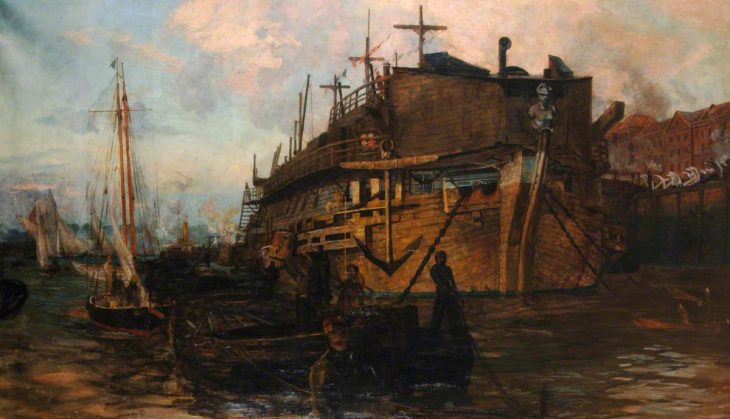‘Ding, Clash, Dong, BANG, Boom, Rattle, Clash, BANG, Clink, BANG, Dong, BANG, Clatter, BANG BANG BANG!’ is how Charles Dickens transcribes the sound of 1,200 men building the first iron-clad frigate Achilles at the Royal Dockyard, Chatham, in the 1860s. A Chatham boy, Dickens lived to see — and hear — the age of sail turn into the age of steam, when the creak of ropes, the flap of canvas and the ding of bells gave way to the hiss of steam, the chug of motors and the shriek of whistles. As soundscapes go, both strike the modern imagination as more musical than the roar of road traffic. So they must have struck the imagination of Richard Wilson when he composed ‘1513: A Ships’ Opera’ for foghorn, steam whistle, hooter, siren and cannon, performed by the parade of historic vessels during the Mayor’s Thames Festival of 2013.
Wilson’s witty working drawings feature in a new exhibition, Powerful Tides — 400 Years of Chatham and the Sea. In the week Nigel Farage dumped dead haddock into the Thames in protest at our lack of control over our territorial waters, the exhibition felt more elegiac than celebratory, but its intentions are good: to enlist the imaginations of artists, historical and contemporary, in reconnecting the 80-acre museum site with the waterways it was once part of. Unfortunately, it gets off to a shaky start with Catherine Yass’s ‘Bridge’ (2014), a pair of lightbox transparencies of the empty piers of the old Blackfriars Bridge built to carry the London, Chatham and Dover Railway in 1864 and dismantled 60 years later. A connection broken.
Chatham has a truly glorious history. It was out of the dock now occupied by the second world war destroyer HMS Cavalier that HMS Victory was floated in 1765, 40 years before carrying Nelson to Trafalgar. In the historic section of the show the Victory looms large, presiding majestically over a chaos of cannon smoke, overcrowded lifeboats, and sailors clinging to spars in Turner’s ‘Second Sketch for “The Battle of Trafalgar”’ (c.1823) and limping home to Chatham with the body of Nelson in an earlier monochrome sketch in pencil and wash. A third sketch in oil, the large, atmospheric ‘Steamer and Lightship; a study for “The Fighting Temeraire”’ (1838–39), sets the scene for Turner’s famous celebration of another veteran of Trafalgar, also Chatham-built. The artist who thrilled to the excitement of rain, steam and speed could also shed salt tears over the dying romance of sail.
Dockyards are where ships are born, and go to die. William Wyllie’s late 19th-century ‘The “Gloucester Hulk” at Chatham’ shows a once proud wooden warship rotting away in the glow of a rosy sunset. Its towering bulk contrasts with the sleek piscine bodies of two ‘Submarines in Dry Dock’ (1940) drawn by Eric Ravilious during his first few weeks of service at Chatham as a war artist; on a later posting to Portsmouth he captured — and glamorised — the interiors of these tin-can monsters of the deep. For a taste of the unglamorous reality you can take a tour of Ocelot, the last sub built at Chatham for the Royal Navy in 1962, and imagine yourself hot-bunking with 60 sweaty fellow submariners reduced to washing their pants and socks in their shaving water.
But the crews I pitied were those serving on the old light ships moored off sandbars, pitching and tossing and going nowhere. A wooden model of a Nore light vessel of 1796 from the National Maritime Museum shows lanterns hanging — and presumably swinging while you tried to light them — on the ends of the yardarm; a 1960s model has a central rotating electric light. Called The Kentish Knock after the shoal above which it floated (and which delivered said knock when collided with) this vessel was taken out of service in the late 1970s. It is namechecked in printmaker Chris Orr’s nostalgic a ‘Rustbucket — a hymn to the Lightships’ (2016).
The light ships have gone dark, the jetties silent and the only sound disturbing the peace of Chatham’s Dockyard, once swarming with shipbuilders, is the chatter of school groups. If further reminders were needed that we are the hulk of a seafaring nation haunted by ghosts, Christiane Baumgartner provides one in ‘Medway River’ (2013), a series of spectral photogravures of the shivered timbers of ancient wrecks exposed along the estuary at low tide.
Despite this exhibition’s best intentions, I came out feeling that our naval history was as hermetically sealed as Yinka Shonibare’s model of ‘Nelson’s Ship in a Bottle’ (2009). But one contemporary artist has made a gesture towards reviving the old seafaring spirit. In 2004 Layla Curtis launched 50 messages in bottles from Ramsgate, optimistically bound for the Chatham Islands in the South Pacific on the diametrically opposite side of the globe. Some were fitted with solar-powered GPS tracking devices to transmit their coordinates back to base: one reached Aberdeen, others turned up in the Netherlands. ‘The bottles have not reported their position for several years,’ we are regretfully informed. Well, at least they travelled hopefully.






Comments